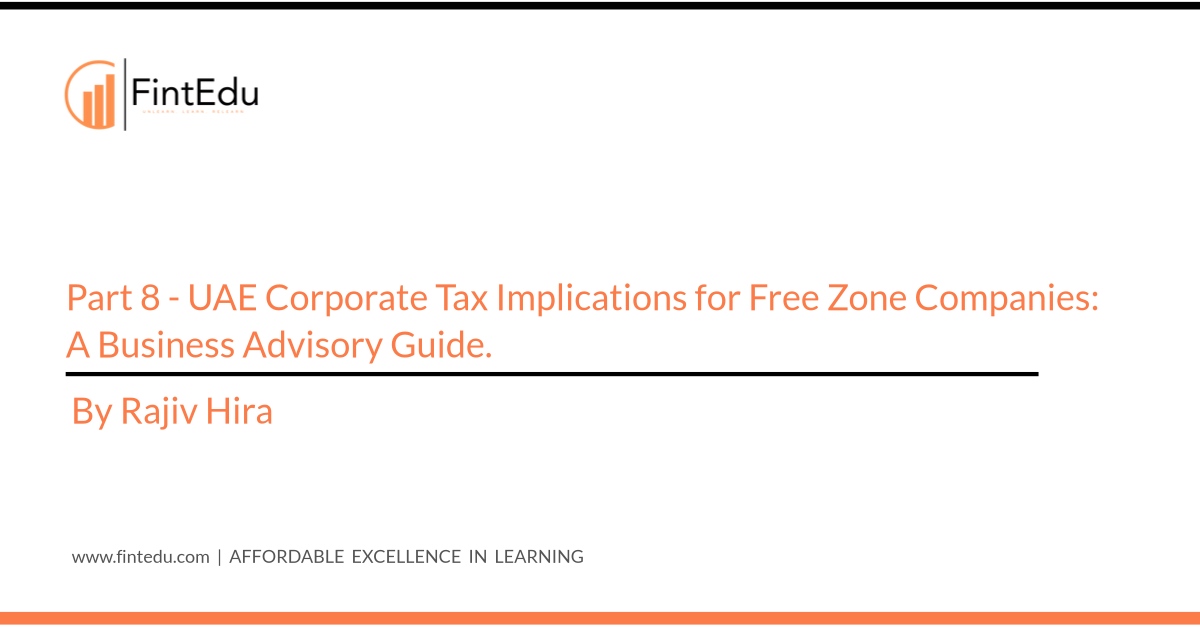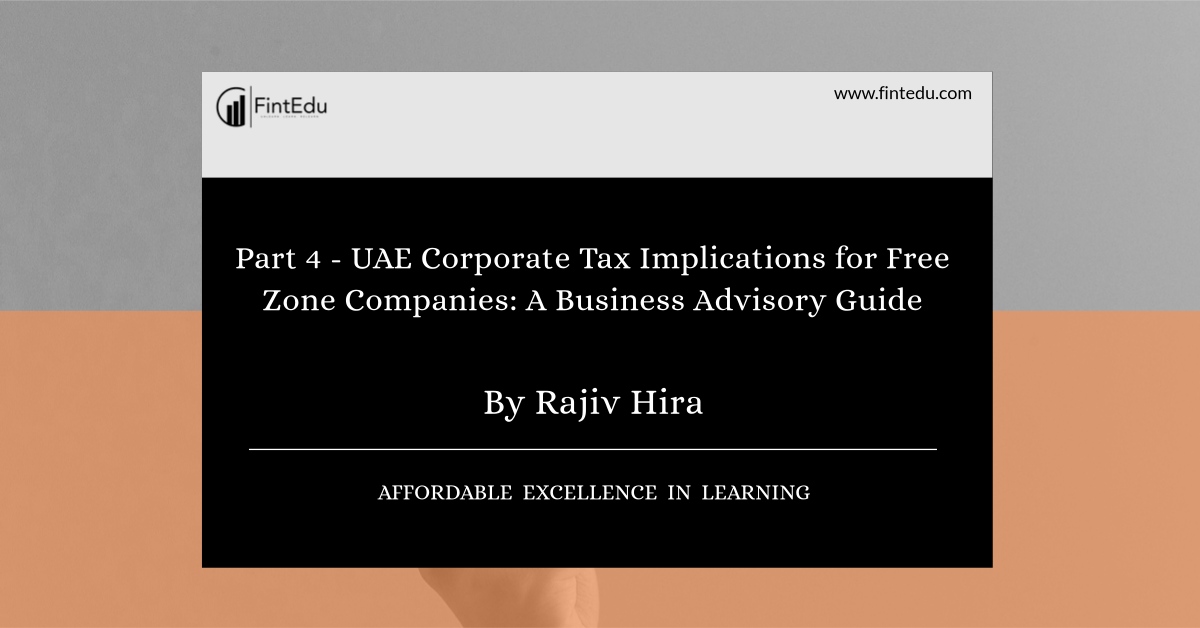LISTEN TO THIS ARTICLE
Designated vs. Non-Designated Zones: Impact on Tax Treatment
A key concept in the Free Zone Corporate Tax regime is the distinction between Designated Zones and other Free Zones (non-designated). This terminology originates from the UAE VAT system, Designated Zones are specific Free Zone areas treated as outside the UAE for VAT purposes under Cabinet Decision No. 59 of 2017. Examples include Jebel Ali Free Zone (JAFZA), Dubai Airport Free Zone (DAFZA), Khalifa Port and Industrial Zone (KIZAD), Sharjah Airport Free Zone, and other secured free trade zones primarily handling goods.
In the context of Corporate Tax, Designated Zones are a subset of Free Zones explicitly recognized in the tax rules for certain activities. The Corporate Tax Law itself does not treat Designated Zones differently from other Free Zones except “distribution of goods or materials in or from a Designated Zone” a Qualifying Activity, where distribution from a non-designated Free Zone is not listed as qualifying. This means that Free Zone companies engaged in trading or distribution of physical goods have a distinct advantage if they operate within a Designated Zone.
Practical implications of being in a Designated Zone versus a Non-Designated Free Zone include:- Trading and Distribution Activities: A company in a Designated Zone can earn 0% qualifying income from the distribution of goods to UAE or overseas customers as long as the core operations of distribution occur in the Designated Zone. For instance, a trading company warehousing products in JAFZA selling the clients can treat that income as Qualifying (since “distribution from a Designated Zone” is a qualifying activity) and thus taxed at 0%, provided it meets the substance test in JAFZA (adequate staff and decision-making within JAFZA for those sales). By contrast, a similar trading company in a Free Zone that is not designated (e.g. Dubai Multi Commodities Centre, which is not a Designated Zone for VAT) cannot count general trading or distribution as a qualifying activity. Such a company’s income would be non-qualifying and likely push it over the de minimis limit, resulting in taxation at 9% on all its income unless it restructures its operations.
- Beneficial Recipient and Flow of Goods: The use of Designated Zones is tightly connected to the physical flow of goods. A Designated Zone often acts as a duty-free logistics hub. The tax rules implicitly leverage this: if goods physically remain in or move through a Designated Zone, the Free Zone seller can maintain the 0% regime even selling to a mainland buyer, because the transaction is considered as happening in a customs/exempt zone. However, if a Free Zone company in a non-designated zone sells to a mainland entity, typically the goods would have to clear customs to enter the UAE market, and that activity doesn’t have a special qualifying status for corporate tax. In planning terms, trading companies that foresee primarily offshore customer bases may consider establishing in a Designated Zone to legally optimize their tax outcome.
- Substance in Designated Zone: Being established in a Designated Zone is not alone sufficient, the FTA guide shows that a company must actually conduct its core business operations in that zone to claim the benefit. If the company is only nominally in the Designated Zone but operates from the city (non-Designated Free Zone area), the advantage could be lost. Therefore, firms in Designated Zones should centralize their key functions (e.g. order management, inventory control, sales negotiations) within the designated zone’s premises.
- Non-Designated Free Zones: These include many popular Free Zones focused on services, media, financial free zone (e.g. DIFC, ADGM), or light industries (e.g. DMCC (JLT), Dubai Internet City, Abu Dhabi Global Market for finance, etc.). Companies here can still be QFZPs (Qualifying Free Zone Person(s)) and enjoy 0% tax, but they must ensure their activities fall under the allowed categories or primarily deal with other businesses in Free Zones. If they engage with the mainland market outside the qualifying scope, they risk taxation. For example, an e-commerce company in a non-designated Free Zone selling to consumers in Dubai is directly dealing with natural persons (excluded activity) and would not qualify for 0% on that income, such a company would need to restructure (perhaps setting up a designated zone and a mainland subsidiary (for the B2C sales)) to preserve its Free Zone benefits.
In summary, Designated Zones offer a more favorable environment for Free Zone companies dealing in goods, effectively extending the Free Zone tax holiday to certain domestic transactions (particularly distribution) that would otherwise be taxable. Non-Designated Free Zones still confer benefits, but companies must be more cautious to stay within qualifying parameters. When choosing a Free Zone or evaluating existing Free Zone operations, businesses should factor in whether Designated Zone status will materially benefit their tax profile and whether they can meet the attendant substance requirements.
Disclaimer: Content posted is for informational and knowledge sharing purposes only, and is not intended to be a substitute for professional advice related to tax, finance or accounting. The view/interpretation of the publisher is based on the available Law, guidelines and information. Each reader should take due professional care before you act after reading the contents of that article/post. No warranty whatsoever is made that any of the articles are accurate and is not intended to provide, and should not be relied on for tax or accounting advice.Related Articles
Part 1 - UAE Corporate Tax Implications for Free Zone Companies: A Business Advisory Guide
Part 2 - UAE Corporate Tax Implications for Free Zone Companies: A Business Advisory GuidePart 3 - UAE Corporate Tax Implications for Free Zone Companies: A Business Advisory Guide
Part 5 - UAE Corporate Tax Implications for Free Zone Companies: A Business Advisory Guide.
Part 6 - UAE Corporate Tax Implications for Free Zone Companies: A Business Advisory Guide.
Part 7 - UAE Corporate Tax Implications for Free Zone Companies: A Business Advisory Guide.
Part 8 - UAE Corporate Tax Implications for Free Zone Companies: A Business Advisory Guide.
Part 9 - UAE Corporate Tax Implications for Free Zone Companies: A Business Advisory Guide.
Contributor
Related Posts

@@PLUGINFILE@@/Part%209%20-%20UAE%20Corporate%20Tax%20Implications%20for%20Free%20Zone%20Compa...
Read More
@@PLUGINFILE@@/Part%208%20-%20UAE%20Corporate%20Tax%20Implications%20for%20Free%20Zone%20Compa...
Read More
@@PLUGINFILE@@/As%20we%20approach%2031%20March%202025%2C%20businesses%20with%20a%20VAT%20year%...
Read More